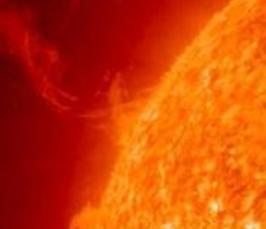ESPOS Seminar: Collisional ionisation and recombination effects on coalescence instability in chromospheric partially ionised plasmas (Giulia Murtas)
ESPOS
- Datum: 12.05.2022
- Uhrzeit: 11:00 c.t. - 12:00
- Vortragende: Giulia Murtas (University of Exeter, United Kingdom)
- Raum: https://zoom.us/j/165498165
- Gastgeber: Shahin Jafarzadeh

Plasmoid-mediated fast magnetic reconnection plays a fundamental role in driving explosive dynamics and heating in the solar atmosphere, but relatively little is known about how it develops in partially ionised plasmas (PIP) of the chromosphere. Partial ionisation can largely alter the dynamics of the coalescence instability, which promotes fast reconnection and forms a turbulent reconnecting current sheet through plasmoid interaction, but it is still unclear to what extent PIP effects influence this process. In this talk, I investigate the role of collisional ionisation and recombination in the development of plasmoid coalescence: I will present 1D and 2.5D simulations of a two-fluid model of a partially ionised plasma (PIP) and show how the dynamics change in the presence and absence of ionisation and recombination processes. The aim is to understand whether these two-fluid coupling processes play a role in accelerating reconnection. In 1D calculations, as the current sheet collapses it drives a burst of ionisation. This results in the current of the current sheet growing at a slower rate than calculations without ionisation and recombination, and in a thicker current sheet. In 2.5D calculations, it is found that, in general, ionisation-recombination process slow down the coalescence. Unlike our previous models that included thermal collisions only, ionisation and recombination stabilise current sheets and suppress non-linear dynamics, with turbulent reconnection occurring in limited cases: bursts of ionisation lead to the formation of thicker current sheets, even when radiative losses are included to cool the system. Therefore, the coalescence time scale is very sensitive to ionisation-recombination processes.